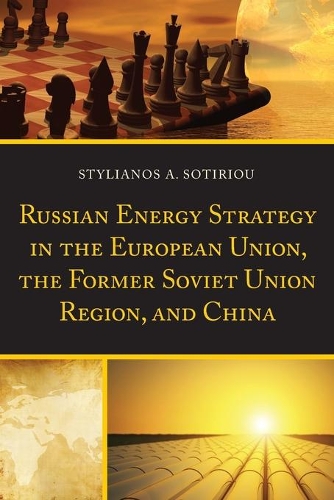
Russian Energy Strategy in the European Union, the Former Soviet Union Region, and China
(Paperback)
Available Formats
Publishing Details
Russian Energy Strategy in the European Union, the Former Soviet Union Region, and China
By (Author) Stylianos A. Sotiriou
Bloomsbury Publishing PLC
Lexington Books
24th May 2016
United States
Classifications
Professional and Scholarly
Non Fiction
Asian history
European history
327.5
Physical Properties
Paperback
294
Width 152mm, Height 229mm, Spine 21mm
431g
Description
This book places Eurasia in its entirety within a single explanatory framework and examines, for the first time to that extent, Russia as a Eurasian energy power in its affairs with the two main geopolitical players of the region, the EU and China. Part of this geopolitical space is the Former Soviet Union (FSU) region which shares deep historical-political ties with Russia and constitutes the necessary crossing for the latters natural gas supplies en route to the EU market. In this way, an energy triangle is established, with Russia at the top angle, the EU in the left angle, China in the right angle and the FSU region the median. Following the scheme, three bipolar relationships emerge, Russia-FSU region, Russia-EU and Russia-China, with each of them representing a different type of bilateral cooperation. In the first case there is an asymmetric relationship with one actor being overly powerful, in terms of energy, to impose its conditions, economic and political, on the other. In the second case there is a symmetric relationship with both actors having equal means of pressure at their disposal. Finally, in the third case there is balanced relationship with both actors trading on an equal basis. Within this framework, one of the dominant theoretical debates in the field of International Relations, that between Neorealism and Neoliberal Institutionalism (the so-called Neo-Neo debate) seeks to shed light on the governing rationale beyond Putins Russia foreign energy policy vis--vis the FSU region, the EU and China.
Reviews
In this book, Stylianos Sotiriou develops a framework that views energy-related issues as an essential part of Russian foreign policy. The books focus is on energy policy in the Eurasian geopolitical space, an issue that is analysed here through an essentially Russian lens. The author provides valuable theoretical considerations and offers substantive empirical data on Russias energy strategy and spectrum of tactics. By focusing on natural resources management during the 2000s, the book does actually succeed in providing an insight into Russias profit maximisation strategy.... [T]he books contribution to the rationale of Russian energy policy deepens our understanding of energy relations in the Eurasian region. The book is well grounded on a huge number of primary and secondary sources and a dataset consisting of official publications and documents, statistics from energy firms as well as policy papers. The book is recommended to anyone with an interest in Russias energy-related issues. * Europe-Asia Studies *
The crisis in Ukraine has brought power politics back to the agenda of European thinking about international relations. The provision of energy is one of the most important Russian power instruments in the Eurasian arena. Stylianos Sotirious study provides for a comprehensive survey of Russias foreign energy policy towards the European Union, China and the successor states of the Soviet Union during the 2000s. By doing so, he demonstrates very convincingly the limits of international institutions in this specific policy field. This wide-ranging book is recommended to all readers who seek a comprehensive and timely overview over Russian energy politics. -- Andreas Nlke, University of Frankfurt
The emergence of Russian energy power since the beginning of 2000s is widely considered as a key feature of the geopolitics of the entire Eurasia region ever since. This book provides a theoretically informed, thorough examination of the Russian energy policy toward the EU, the Former Soviet Union Region and China. It does so in an innovative way, namely by digging under the surface of current International Relations theory: a valuable contribution to our understanding of the complex geopolitics of the Eurasia region. -- Christos Paraskevopoulos, University of Macedonia
In this book, Stylianos A. Sotiriou analyzes Russias energy strategy, its European, Eurasian, and Asian components, as well as their inter-connectedness. The reader will find it to be an ambitious, theoretically informed synthesis of various aspects of Russias energy relations. -- Andrei P. Tsygankov, San Francisco State University
Author Bio
Stylianos A. Sotiriou is lecturer at the International Hellenic University.
